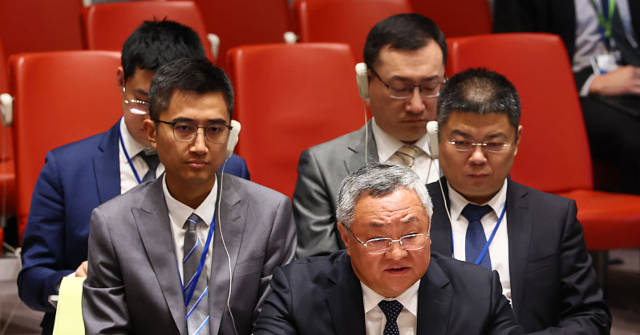The Chinese Communist Party, alongside Russia and Pakistan, spearheaded efforts on Sunday to pass a resolution at the United Nations Security Council condemning attacks on Iran’s illicit nuclear facilities.
The resolution has not come up for a vote at the Council at press time and the United States is expected to veto any such move, but China’s active participation in the effort highlights Beijing’s prioritizing of its ally Iran’s geopolitical concerns, particularly as it endures an onslaught of military activity by Israel and America intended to stop its prodigious uranium enrichment.
The Security Council met on Sunday after President Donald Trump announced on Saturday night that the U.S. military had entered Iranian airspace and bombed three of Iran’s most critical uranium enrichment facilities at Fordow, Natanz, and Isfahan. Trump called the strikes a “spectacular military success” and called for Iran to “make peace” or face “far greater and a lot easier” military action from America in the near future.
The strikes followed months of American diplomatic efforts to broker an agreement in which Iran would agree to limit its uranium enrichment in exchange for sanctions relief. Iranian officials adamantly refused to consider limiting enrichment in any way, despite the levels of enrichment in the country being far beyond what is necessary for any civilian use.
Another wing of the United Nations, the International Atomic Energy Agency (IAEA), passed a resolution on June 12 condemning Iran for violating international legal standards on nuclear development. Hours later, the government of Israel began a targeted campaign to eliminate Iran’s top military officials and damage Tehran’s ability to attack the country. Iran responded with several rounds of missile attacks on Israeli population centers.
The government of China, allied with Iran through the BRICS anti-American international coalition, has consistently defended Iran’s activities and condemned America and Israel as aggressors. Beijing has not condemned Iran’s violations of international law or the regime’s decades of calls for “death to Israel” and “death to America.”
During the Security Council meeting on Sunday, China’s representative aggressively condemned the Trump administration for acting against Iran’s uranium enrichment, claiming that it “exacerbated tensions in the Middle East and dealt a heavy blow to the international nuclear non-proliferation regime.”
“China stands ready to work with the international community to foster synergy, uphold justice, and make unremitting efforts to restore peace and stability in the Middle East,” U.N. envoy Fu Cong asserted, stating that Beijing “cannot stand idly by in the face of a major crisis.”
The resolution China is co-proposing at the Security Council reportedly calls for an “immediate and unconditional ceasefire” between Iran and the Israeli-U.S. coalition. Some reports indicate that the text of the resolution as currently known also condemns the strikes on Iran’s nuclear facilities, though does not mention the United States by name.
Outside of the United Nations, the Chinese Foreign Ministry on Monday sternly condemned America’s actions and touted the alleged “draft resolution” at the Security Council as one potential option in addressing the situation. Foreign Ministry spokesman Guo Jiakun did not condemn Iran’s uranium enrichment or missile attacks on Israeli civilians.
“The U.S. attacks on Iran’s nuclear facilities seriously violate the purposes and principles of the U.N. Charter and have exacerbated tensions in the Middle East,” Guo declared.
“Attacking nuclear facilities under the safeguards of the IAEA seriously violates the purposes and principles of the U.N. Charter and international law,” Guo declared. “China urges parties to the conflict to prevent the situation from spiraling up, make sure the fighting will not spill over, and return to the track of political settlement.”
Guo said that China is also looking for a greater role in the conflict, offering to “enhance communication and coordination with various parties to pool efforts together and uphold justice, and play a constructive role for restoring peace in the Middle East.”
Iran is arguably China’s closest ally in the Middle East. The Iranian regime is allied to China through the BRICS coalition — whose core members are China, Brazil, India, Russia, and South Africa — and is one of China’s most important sources of oil. Significant evidence indicates that China helps Iran evade sanctions on its oil industry, resulting in the Trump administration sanctioning multiple Chinese companies this year for sanctions violations related to Iran.
The Chinese government was among the first to condemn Israel for conducting airstrikes targeting Iranian leaders in Tehran, which began on July 13. Chinese state media operations blamed the United States for Iran engaging in a dangerous volume of uranium enrichment, claiming that the dissolution of the 2015 Joint Comprehensive Plan of Action (JCPOA) led to the rise in Iranian activity. The JCPOA technically still exists, but President Trump withdrew from the Obama-era agreement in 2018 on the grounds that Iran regularly violated its provisions.
“The U.S. bears responsibility for the Iranian nuclear issue,” the Chinese state propaganda newspaper Global Times claimed last week. “If Washington had not unilaterally withdrawn from the Joint Comprehensive Plan of Action (JCPOA), and if the agreement had been smoothly and effectively implemented, the issue very likely would not have deteriorated to its current state.”
Guo, the Chinese Foreign Ministry spokesman, told reporters on Monday that Beijing is “in communication” with Tehran regarding the conflict — particularly through the relationship between Foreign Minister Wang Yi and Iranian counterpart Abbas Araghchi.
Follow Frances Martel on Facebook and Twitter.
Read the full article here


